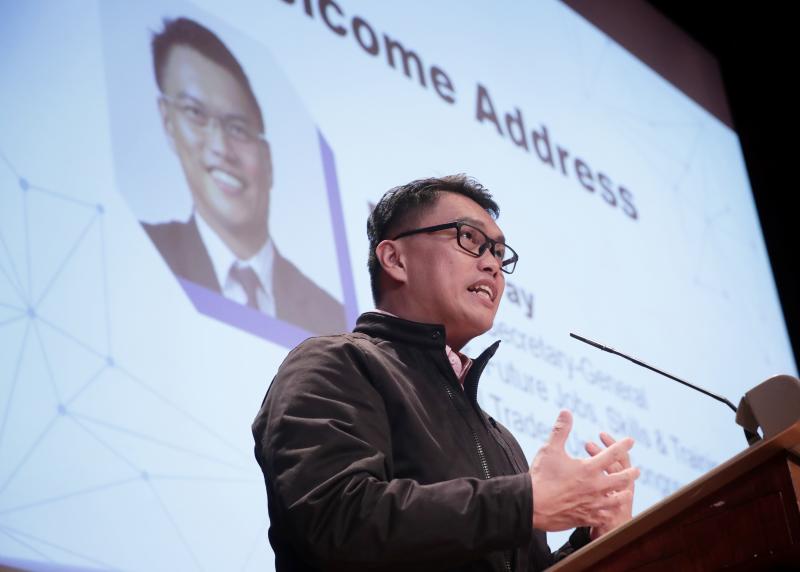NTUC calls for top-up of SkillsFuture Credit in its wish list for Budget 2019
Sign up now: Get ST's newsletters delivered to your inbox

NTUC assistant secretary-general Patrick Tay sharing his wish list for working professionals ahead of Budget 2019 at the NTUC Building on Feb 1, 2019.
ST PHOTO: KELVIN CHNG
Follow topic:
SINGAPORE - The labour movement is calling on the Government to provide an additional $500 in SkillsFuture Credit to help workers upgrade their skills.
It also hopes to see extensions for the Special Employment Credit scheme (SEC) and the Career Support Programme, two salary support schemes that strive to boost the employment prospects of older workers and professionals, managers, executives and technicians (PMETs).
The labour movement suggestions are on the Budget wish list shared by National Trades Union Congress assistant secretary-general Patrick Tay on Friday (Feb 1), speaking to reporters on the sidelines of the Future Jobs, Skills and Training Forum.
Mr Tay said that some workers have used up all $500 of their SkillsFuture Credit but want to learn a second skill. The credit is given to all Singaporeans aged 25 and above since January 2016.
A top-up now is timely, he added, because the half-life of skills is five years, which means about half of what was learnt five years ago is irrelevant now.
"Because of rapid changes and transformation, you can't just have one skill and it can keep you going for the rest of your life, you probably have to reskill quite often," he said.
As for the Special Employment Credit scheme, which subsidises the wages of Singaporean workers aged 55 and above who earn up to $4,000 a month, Mr Tay said NTUC hopes to see it extended for another three years to encourage employers to hire and retain older workers as the population ages.
The scheme was extended once in 2017 and ends in December this year.
Mr Tay said the Career Support Programme, which subsidises the wages of mid-career or long-term unemployed people hired into PMET jobs and is due to end next month, should be extended for another two years, as early successes have been seen in getting workers into new jobs.
"Amid global uncertainties and an uncertain outlook, coupled with structural challenges including great transformation and technological developments, the labour movement hopes this year's Budget 2019 will have a greater focus to help workers in training and upgrading, as well as helping both workers and employers, as well as our tripartite partners, leverage some of the existing programmes to make sure they continue to stay employed and employable," he said.
NTUC secretary-general Ng Chee Meng, in a speech at the same event, said the labour movement will also focus this year on helping workers secure better wages, welfare and work prospects.
Laying out how this will be done, Mr Ng said NTUC will help coordinate workers' training through the NTUC Training Council, so they can reap the benefits of the industry transformation maps (ITMs).
The labour movement will also advocate for enhanced protection for the labour rights of workers and freelancers and look at extending the progressive wage model to more sectors and lower-wage professionals, managers and executives.
It will work with the Government to review the retirement and re-employment ages as well, and look at how to help manage the cost of living through its social enterprises.
Mr Ng added that workers themselves must also transform to prepare for change and for Singapore to leverage opportunities.
The tripartite model, he said, must also go beyond the traditional collaboration between the unions, government and employers. They should adopt a "systems thinking" approach, where they look at sectors as ecosystems and try to solve problems upstream.
Providing an example, he said this "systems thinking" approach led to the setting up of the Singapore Bus Academy in 2016, to address the lack of skilled Singaporean bus captains.
Addressing about 500 people, including union leaders and company management, at One Marina Boulevard, Mr Ng also said that although slower growth is expected this year in the global economy, Singapore is still in a good position.
This is because of its strong brand, geographical location in Asean and high quality workforce.
"We have strong institutions, a strong investment environment, and a strong innovation index - very good positive foundations that we can build on for the next lap of our development," he said.

